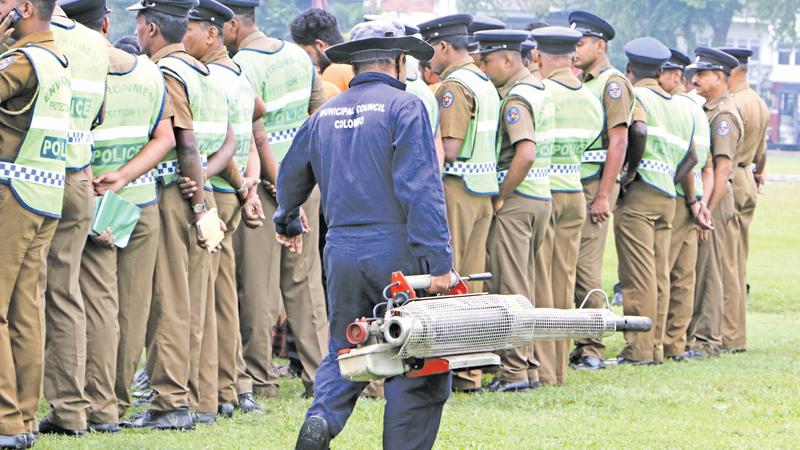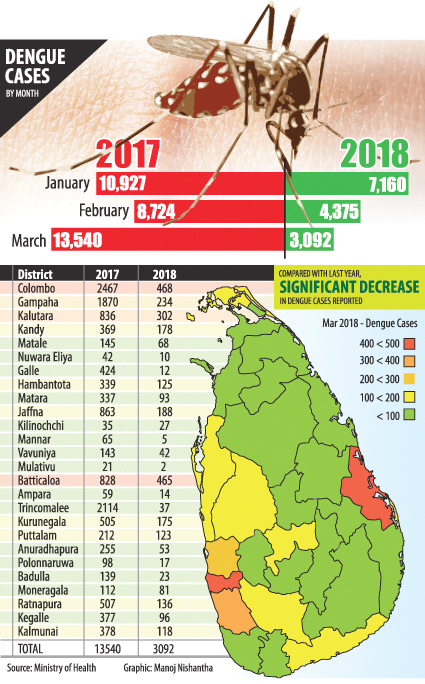
The dreaded Dengue epidemic, which affects thousands of Sri Lankans annually, has been at bay so far this year. However, with the onset of the South West monsoon, a hike in dengue incidence is expected, with medical professionals already warning of a spike in diagnosed cases in the past several weeks. For officials and medical experts working in the area, preventative action ahead of the rains, including public awareness campaigns, clean up and chemical fogging of vulnerable sites, is a current preoccupation.
“This year,13 deaths were recorded due to dengue so far, which is very much lower than the numbers at this time, last year,” said Consultant Community Physician of National Dengue Control Unit, Dr. Prashila Samaraweera. However, she said, as a preventive measure to control incidence during the upcoming rainy season, the National Dengue Control Week held from April 3 to 9, where 3,000 teams had been deployed sought to destroy both existing and potential dengue breeding sites.
Dr. Samaraweera said, another important step is the android app that was introduced to parents of the schoolchildren, which could be downloaded via the app store. If a student is having fever and is suspected of dengue, the parent can inform the school via this app. “If five or six students from the same school contact dengue, there is a likelihood of dengue being sourced from the school. Therefore, the relevant medical officer and school can observe this to intervene,” said Dr. Samaraweera. Then, source reduction campaigns will be conducted to discover and destroy mosquito breeding sites. Also, students will be asked to take precautions when coming to school, such as applying mosquito repellent.
Dr. Samaraweera says, in addition, a special campaign is conducted monthly to ascertain the increased number of dengue cases from daily reports. “We spot the areas showing increased trends and request the Police, Tri Forces and Health officers to inspect the houses and other buildings in the area, for mosquito breeding sites.”
An urban disease
 As per statistics from the Epidemiology Unit of the Ministry of Health, a total of 14,609 dengue cases have been recorded from January to March, 2018. Of this, the highest number of cases were recorded in the Colombo district (2,242), with Batticaloa ( 1,559), Jaffna( 1,135), Gampaha ( 1,348) and Kalutara (1,047) also recording high numbers.
As per statistics from the Epidemiology Unit of the Ministry of Health, a total of 14,609 dengue cases have been recorded from January to March, 2018. Of this, the highest number of cases were recorded in the Colombo district (2,242), with Batticaloa ( 1,559), Jaffna( 1,135), Gampaha ( 1,348) and Kalutara (1,047) also recording high numbers.
“Dengue is an urban disease, the high population density contributing to its spread. For example, in certain areas of Colombo, the population density is 24,000 per square kilometer, which is on par with that of Paris.Within Colombo, population density ranges between 14,000 to 24,000 per square kilometer. So dengue mosquitoes can infect more people in urban areas, said Chief Medical Officer of Health, Colombo Municipal Council, Dr. Ruwan Wijayamuni.
Dr. Wijayamuni said, no dengue related deaths were reported thus far, this year from Colombo,which is a positive trend. He said, to further improve the trend, the National Dengue Control Week has been held early this year. Accordingly, 150,000 houses within the Colombo city are being inspected for potential mosquito breeding places.
“ These mainly include water receptacles. Around 12 out of every 100 houses in Colombo have blocked drains or blocked gutters, which act as potential breeding sites. Also, one out of every five houses is situated in high risk areas of dengue,” he said.
As a preventive measure, special attention is given to these potential mosquito breeding sites. Leaking taps inside the houses, with containers placed underneath to collect water, is one example of a major breeding site, often overlooked, Dr. Wijayamuni says.
“Most of the time, nobody checks nor empties the water in these containers,” he said.
Cooling towers are another potential breeding site, where mosquitoes breed within , said Dr. Wijayamuni.
On April 3, as many as 100 five member teams were deployed to inspect mosquito breeding places. “ If receptacles with mosquito larvae is discovered, we will be taking legal action against the owner of the property where it is found. If there are potential breeding places, we will issue them a notice,” he said.
Meanwhile, Consultant Physician of the National Institute of Infectious Diseases, Angoda, Dr.Ananda Wijewickrama said, although the dengue patient numbers decreased dramatically from January to March, but there has been a spike in numbers last week. “Unless urgent action is taken, there will be another large scale dengue outbreak within the next two to three weeks,” he said.
Dr. Wijewickrama further said, the numbers of dengue patients generally start increasing from early May, but this year, increasing trends have already begun.
“ This is why the National Dengue Control Week started early this year. But we need everybody’s support to keep the numbers at a minimum,” he said.
Speaking of the facilities at the Institute, in the event of a large scale outbreak, he said, monitoring each and every patient will be difficult when the numbers are high.
“ Last year, we accommodated more patients than we could. At certain instances we placed two beds together and allocated them to three patients,” he said.
He said, the 70 bedded special dengue unit, that is being built at the Institute, is required urgently, to accommodate the increasing number of dengue patients. “ This facility was started two years ago, but the construction has been slow. We need it soon, as otherwise it would be difficult to manage the patients,” he said.
Every year, there are two peaks of dengue, followed by the South-West monsoon from May to September and the North- East monsoon from December to February, said Dr. Wijayamuni.
“It only takes five days for the eggs laid by mosquitoes in water receptacles to develop into adult stage. This is worse during periods of scattered rain, where mosquito density soars soon after the rain,” he said.
New drugs for dengue?
A team of local doctors are involved in researching a drug for dengue, to prevent hemorrhages.
Director, Center for Dengue Research, University of Sri Jayawardenapura, Prof. Neelika Malavige said, in the initial drug trials, the drug was proved effective when administered to patients prior to the hemorrhaging stage.
“ Currently, the second stage of the drug trial is being conducted in the Out Patient Department of the National Institute of Infectious Diseases, where a double blind placebo controlled drug is being given to ensure the results are unbiased,” she said.
In a double blind trial, neither the doctor nor the patient knows which patient is being administered the actual drug and which patient is being administered the placebo. A placebo is a substance with no therapeutic effect, such as a starch tablet.
Prof. Malavige said 280 patients are needed for the trial, but not even half the numbers are found yet.
“Some patients show dengue like symptoms, but what they are actually having is viral flue. We need to ensure they are dengue patients, in order to include them in the trial,” she said.
Prof. Malavige said if this number of patients are found, trials will be concluded by August.
“We remain hopeful, but at the same time we have to stick to standard practices in drug trials,” she said.
As a fall back plan in the event the drug is not successful, the team has identified a plant substance that is effective against dengue.
“The active ingredient of this plant substance inhibit the process that drives severe dengue. We are currently looking for an international patent for this substance,” she said.
Prof. Malavige explained, a test, which can distinguish between patients who are likely to develop severe dengue and who are likely to develop mild fever, at the time of admission to the hospital, is also being developed.
“Any of the four dengue viruses, type 1, 2, 3 or 4, can result in severe dengue due to leakage of blood plasma from the capillaries. Therefore, this test will help identify such cases earlier,” she said.
Colombo Municipal Council kicked off its dengue prevention program last week, under the patronage of its newly appointed Mayor, Rosy Senanayake. Accordingly, a rigorous inspection program will be conducted from Colombo 1 to 15, where each house will be combed for mosquito breeding sites. Dengue free residents will be marked with a sticker in the process. Currently, the Colombo city remains a high risk zone for dengue.
Mayor Rosy Senanayake, the first woman to hold the position, has made dengue prevention and eradication a priority in her new administration.
